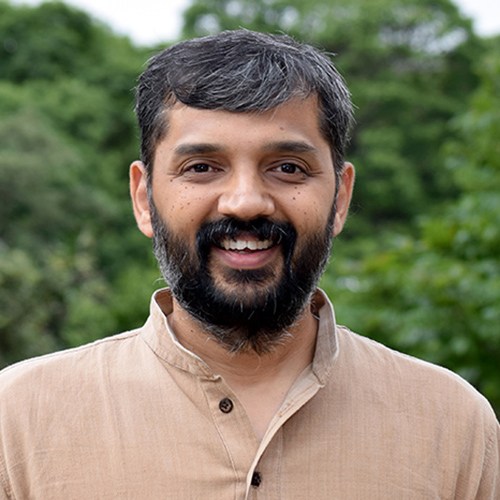Summary
Deepak Malghan is a chemical engineer and ecological economist at the thermodynamics and scale theory interface. Scale in ecological economics refers to the proportional relationship between the economy and the ecosystem that contains and sustains it. Among other recognitions for his contributions to scale theory, Malghan received the 2015 VKRV Rao Prize in Social Sciences and the 2023 T N Khoshoo Memorial Award. Malghan has served as an editor at Ecological Economics, the field’s flagship journal, since 2018.
Malghan is an affiliated researcher at the Stockholm Environment Institute, and his translational ecological economics research has focussed mainly on urban hydrology problems.
Beyond ecological economics, Malghan’s Ecological Political Economy group at IIMB has pioneered new methods for characterizing ethnic inequality and stratification by combining tools and insights from economics, demography, and political science. His current projects apply these methods to study classical and emerging problems in ethnic politics and environmental injustice.
As a historian, Malghan is the co-author of an intellectual biography of J. C. Kumarappa (1892-160), a pioneering Indian ecological thinker and political philosopher (Oxford University Press, 2016). He is currently working on a book project (provisionally titled Citius, Altius, Fortius: A History of How the World Became Efficient) that develops the global history of the modern idea of efficiency.
Accomplishments
Articles (2021 —)
- Shah, A., Sugathan, A., Malghan, D., Kim, R., & Subramanian, S. V. (2025). Spatiotemporal changes in heat stress exposure in India, 1981-2023. Nature Communications, 16, 9496. [reprint preprint]
- Shah, A., Thapliyal, S., Sugathan, A., Mishra, V., & Malghan, D. (2025). Caste inequality in occupational exposure to heat waves in India. Demography, 62(1), 35-60. [reprint preprint]
- Sugathan, A., Shah, A., & Malghan, D. (2025). Washed Away: Industrial Capital, Labor, and Floods. Environmental Research Letters 20, 024023. [reprint preprint]
- Shah, A., Sugathan, A., Bharathi, N., Rahman, A., Garg, A., & Malghan, D. (2025). On measuring Muslim segregation in urban India. Urban Studies, 62(8), 1650-1668. [reprint preprint]
- Vivek, V., Kar, T., Meka, S., & Malghan, D. (2024). Combining price and non-price interventions for water conservation. Environmental Research Letters, 19, 104066. [reprint preprint]
- Bharathi, N., Malghan, D., Mishra, S., & Rahman, A. (2024). Status Inequality and Public Goods. World Development, 176, 106526. [reprint preprint]
- Rothler, Y., Blakeslee, D., Malghan, D., & Fishman, R. (2024). Economic factors mediate the impact of drought on farmer suicides in India. Global Environmental Change, 86, 102844. [reprint preprint]
- Bharathi, N., Malghan, D., & Rahman, A. (2023). Ethnic diversity and economic development with spatial segregation. Economics Letters, 222, 110951. [reprint preprint]
- Bharathi, N., Malghan, D., Mishra, S., & Rahman, A. (2022). Residential segregation and public services in urban India. Urban Studies, 59(4), 2912-2932. [reprint preprint]
- Blakeslee, D., Chaurey, R., Fishman, R., Malghan, D., & Malik, S. (2021). In the heat of the moment: Economic and non-economic drivers of the weather-crime relationship, Journal of Economic Behavior & Organization, 192, 832-856. [reprint preprint]
- Malghan, D., & Swaminathan, H. (2021). Global trends in intra-household gender inequality, Journal of Economic Behavior & Organization, 189, 515-546. [reprint preprint]
- Vivek, V., Malghan, D. & Mukherjee, K. (2021). Toward achieving persistent behavior change in household water conservation. Proceedings of the National Academy of Sciences of the United States of America (PNAS), 118(24), e2023014118. [reprint preprint]
- Bharathi, N., Malghan, D., Mishra, S., & Rahman, A. (2021). Fractal urbanism: City size and residential segregation in India. World Development, 141, 105397. [reprint preprint]
- Malghan, D., (2021). (Un)flatten the curve: A simple model of sink capacity, Ecological Economics, 182, 106826. [reprint preprint]
- Bharathi, N., Malghan, D., & Rahman, A. (2021). A permanent cordon sanitaire: intra-village spatial segregation and social distance in India. Contemporary South Asia, 29(2), 212-219. [reprint preprint]
- Tomer, S. K., Sekhar, M., Balakrishnan, K., Malghan, D., Thiyaku, S., Gautam, M., & Mehta, V. K. (2021). A model-based estimate of the groundwater budget and associated uncertainties in Bengaluru, India. Urban Water Journal, 18(1), 1-11. [reprint preprint]
- Bharathi, N., Malghan, D., Mishra, S., & Rahman, A. (2021). Diversity deficit and scale-flip. The Journal of Development Studies, 57(4), 695-713. [reprint preprint]
- PhD, University of Maryland
- MPA, Princeton University

